Farmer Focus: Machinery costs under investigation
 Charlie Cheyney © Hugh Knutt
Charlie Cheyney © Hugh Knutt Finally, the warm weather has come. We knew it would change to blisteringly hot sooner or later and with it, harvest feels a lot closer.
For us, this means trying to finish all the projects that have spilled out of winter. One is our mobile chicken shed and the other is our milk vending machine.
As a means of diversifying income – and after seeing the success of other milk vending machines, combined with our own successful egg honesty box system – this seemed like a good area to expand into.
See also: Farmer Focus: Finding the right regen farming rotation
The financial benefits may be relatively minimal, especially at first, but we hope this gives our business somewhere to grow in the future, as well as providing good PR with the locals. This is always useful when muckspreading or carting maize through the village.
To sharpen up our financials, we have been combing through farm costs.
The first area to slash is machinery costs.
Our kit strategy has been varied, with most machines being second-hand, except for high-use loaders.
Tractors have been bought at about 3,000 hours, to be run to 6,000-7,000. This has meant no warranty, but made the initial purchase a bit easier.
We also have a few classics in the fleet that are up to 19,000 hours that keep working on. Looking into what each machine is costing us makes for interesting reading.
Although the older machines have had some big repairs, parts have often been reconditioned or aftermarket. And we normally do the work ourselves, or use independent mechanics, which keeps costs down.
In fact, it has been the 7,500-hour tractor in the newer fleet that has been singled out as a major culprit. Despite no major issues, niggly errors are now common, which take a long time to diagnose and are often expensive to fix.
What is a perfectly good tractor mechanically needs to be traded in for a newer model with few differences except a bit of precious warranty. It does make me question the future of our machinery and its longevity, and what the future of this tractor may be.


